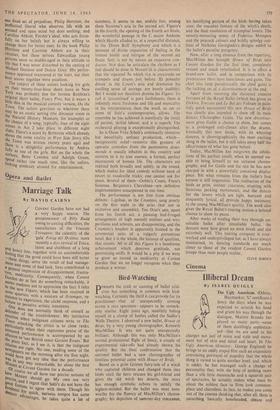) era and Ballet
Marriage Talk
By DAVID CAIRNS
COVENT Garden have not had a very happy season. The postponement of Billy Budd owing to casting difficulties, the cancellation of the Visconti Trovatore, the calamity of the 'gala' Forza del Destino, more recently a dire revival of Tosca, latest and shabbiest of a long and hoary line, together with an uncomfortable feeling that the good could have been still better --these things, some the result of bad manage- Ment and some of bad luck, have contributed to a general impression of disappointment, frustra- tion, mediocrity. Consequently, when Covent Garden do at last do something remarkable, it seems madness not to appreciate the fact. I refer to the new Figaro, which has been received in some quarters with a mixture of ill-temper, re- sistance to experience, the cliché response, and a failure to perceive artistic intentions. Pne "d does not normally think of oneself as erider of the establishment. My instinctive 7.actinn when indignant citizens write to The v,,Itnes attacking the critics is to close ranks, —atticularlY when their rapturous praise of the ace._nsured performance is accompanied by an Jlusion to 'our British tenor Geraint Evans.' But ul,e, Plain fact, as I see it, is that the indignant citizens are right. No one, reading some of the tiLew.aPapers on the morning after the first night, Zuld have got any idea that the performance 480 in any way remarkable, let alone the best
_z_art at Covent Garden for a decade.
houwf Course we all have our precise notions of Pre ' Mozart should go. My own are very %,,o_dse, and I regret that Solti's do not have the ill fortune to agree with them. Though his fdisti ness f°rquick, nervous tempos has some net advantages, he takes quite a lot of
numbers, it seems to me, unduly fast, among them Susanna's aria in the second act, Figaro's in the fourth, the opening of the fourth act finale, the wonderful passage in the C major Andante which Haydn alluded to, at a respectful distance, in the 'Drum Roll' Symphony and which is a moment of divine expansion of feeling in the intense bustle and intrigue of the second act finale. Solti is not by nature an expansive con- ductor. Nor does he articulate the rhythms as I feel should be done in Mozart (it is characteristic that the repeated As which rise in crescendo on trumpets and drums just before `Ei posseder dovra' in the Count's aria and dramatise his swelling sense of outrage, are barely audible). But I would not therefore dismiss his Figaro. To call it 'streamlined' is pure foolishness; there is infinitely more freshness and life and musicality in his interpretation than the word, so apt to some of Solti's contemporaries, allows. The ensemble he has achieved is manifestly the result of patient, skilful labour, and it is superb. The orchestral playing is exceptionally distinguished.
So is Oscar Fritz Schuh's continually inventive but beautifully unfussy production, which— inexpressible relief—removes this greatest of operatic comedies from the pantomime demi- monde it usually inhabits in this country and restores to it its true essence, a formal, perfect microcosm of human life. The characters are realised both broadly and subtly, in the round, which makes for ideal comedy without need of resort to vaudeville tricks; one cannot ask for more. Several of them—Gobbi's Count, Freni's Susanna, Berganza's Cherubino—are definitive impersonations unsurpassed in our time.
The performance is not free from obvious defects: Ligabue, as the Countess, sang poorly on the first night in the arias (but not in recitative and ensemble); Teo Otto's sets, apart from his fourth act, a pleasing leaf-fringed arrangement of high moonlit trellises and wiry pavilions and arbours, are disappointing, and the Countess's boudoir is apparently located in the ceremonial suite of a vulgarly pretentious hotel. But it is the whole, the balance of qualities, that counts. All in all this Figaro is a handsome achievement which deserves gratitude, not patronising sniffs. It would be a pity if we were to grow so inured to mediocrity at Covent Garden that we no longer recognise when they produce a winner.


































 Previous page
Previous page